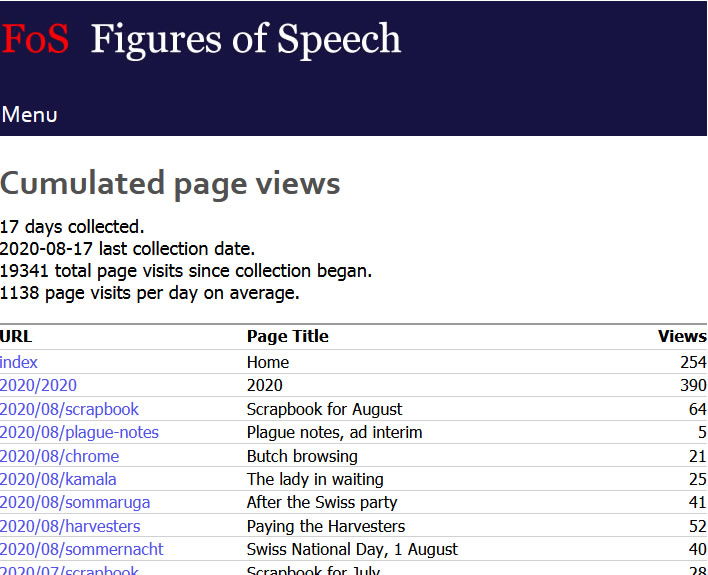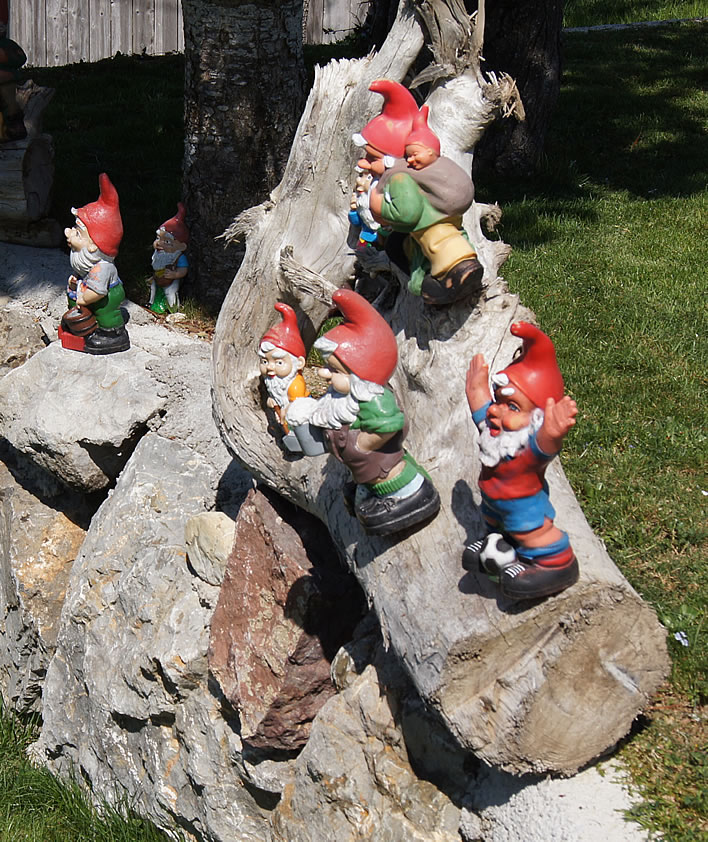Scrapbook for August 2020
Richard Law, UTC 2020-08-01 02:01
28.08.2020 – FoS website changes
The title on the year page is being given a background image in a style consistent with the home page menu.
- On the menu for the current year the title background will change about every week. The images will be timed to the current northern hemisphere season and will have a Swiss theme.
- The title images on menus for previous years are still work in progress.
21.08.2020 – The guess: the new real
Almost every day, the UK government, now completely detached from reality, gives us hobby philosophers something to think about.
Today we have to wrestle with the concept of an (academic) 'examination'. We don't have to wrestle much, since the Oxford English Dictionary has already got the term in a semantic half nelson: 'A formal test of a person's knowledge or proficiency in a subject or skill'. Everyone can surely get behind that definition. Examination results are therefore the scores achieved in this test.
Having abandoned all testing because of its own Corona panic, the government is now in an epistemological bind of its own making: if there isn't a test, how can you have results?
Results have to be manufactured without the need for tests. In what way such results can still be called 'exam results' is baffling, since no examination has taken place. So far the UK government has given us two mutually exclusive solutions to this problem; others may be just around the corner.
The first solution is a redefinition of the 'exam result': it now becomes 'the result of a mathematical computation'. The parameters and arguments of the computation can be whatever you want them to be; in the absence of a real test, there is hardly any basis for weighing one parameter differently from another. The phase of the moon, the relevant star sign and something from the Mayan calendar are all possible. Ultimately, folk wisdom – wise beyond its reputation – would call the output of this computation a 'guess' – and not even prepend 'educated' to it, despite its silly mathematical boastfulness.
The second solution discards the computational figleaf and substitutes the teacher's guess. In the computational solution, the importance of the teacher's guess was downgraded on the grounds that teachers will be optimistic about the chances of their little scholars in a test. That optimism is at the core of the procedure.
The folk wisdom is not at all surprised to learn that the mathematical method led to implausibly low grades for many, whereas the system based on the teacher's forecast led to dazzlingly and quite implausibly high grades for almost everyone. After the former there was widespread protest and mockery; after the latter, no one complained at all. Politics at work.
Your author gives thanks that in those long-ago days when an exam was an exam, his teachers had no influence on the exam results of the miserable worm in their charge, not even having to score classwork. He just had to turn up on the day (in itself not a simple task for him) and scribble something that might get him over the line.
20.08.2020 – Only a matter of time…
… before Tim Worstall explodes.
He has been feeding frequent, pointed, quick-fire, humorous comments on the nonsense found in the media to his eponymous blog for years. His occasional profanities when provoked by idiots mean that the Google search engine does not value his website highly. If you think that occasional, quality swearing sometimes has its place, some evidence is to be found on his blog.
Recently he started the Continental Telegraph, for which he delivers frequent longer pieces in the more temperate language that Google prefers. And more recently he has launched expunct, based on a donation model, for which he writes even longer, more thoughtful pieces.
We lazy writers know that frantic swots like Worstall have no staying power: they will self-destruct sooner rather than later.
18.08.2020 – Page view statistics
In the gloom a few buffeted moths flutter across that darkling internet plain swept with confused alarms of struggle and flight, where ignorant armies clash by night. The searchlight beams of great websites soar up into the night sky, obliterating the stars.
These delicate, single-minded creatures have resisted the lure of the searchlights, the radiance of the phosphorous flares, the flashes of artillery fire, even the deathly glow of the Google moon that fills up every hollow. Ahead of them they see the tiny flicker of a single night-light at the entrance to the barely-visible dugout of this website.
Somehow a few of them find their way to the dim glow of our dugout every day – an astonishing achievement in the circumstances. They are not alone!
In a mad burst of curiosity, on 1 August this year we started to pay attention to the page visits from the fluttering moths for the first time in the six years of the existence of this website. The pageview data before 1 August is no longer available.
The visitors to this website are not tracked or cookied. The page view figures are computed from the server logs, but filtered to exclude visits by search engines and other bots. We have added a page to the website containing the cumulated page views for the period from 1 August to the present, sorted in descending order on the publication date of the web page. The page is accessible from the header menu, which has also been given a few tweaks.

The results are not live, but will usually be updated every day. Since the figures will change from day to day the comment system is not available on this page.
Afterthought 19.08: One of the design goals for the Figures of Speech website was to allow older material to remain relatively easily accessible. The current page view snapshot from the last eighteen days shows that this goal has clearly been achieved.
17.08.2020 – The Slough of Despond, then and now
Still as relevant as it was when it was first published 342 years ago:
This miry slough is such a place as cannot be mended; it is the descent whither the scum and filth that attends conviction for sin doth continually run, and therefore it is called the Slough of Despond; for still, as the sinner is awakened about his lost condition, there ariseth in his soul many fears, and doubts, and discouraging apprehensions, which all of them get together, and settle in this place. And this is the reason of the badness of this ground.
From the chapter 'The Slough of Despond' in John Bunyan (1629-1688), The Pilgrim's Progress from This World to That Which is to Come, first published 1678.
John Bunyan, an itinerant – and frequently imprisoned – preacher, came up with the dream-sequence metaphor for the moral escape from the degenerate mid-17th century world in which he lived.
He defined it exactly, made the vision into an entertaining read that sold sensationally well but seemingly made hardly any difference at all. Certainly, here we still are, plagued by 'fears, and doubts, and discouraging apprehensions'. Nothing has changed.
13.08.2020 – This cannot end well
A cadet of the British royal family marries an American showgirl divorcee with great pomp and at great expense. He flees with her via Canada to sunny California in search of privacy, in which the pair can do good works unhindered by 'hate'. They conspire in the publication of a bestselling book which exposes their own fragile mental states to the world and simultaneously seriously violates the privacy and trashes the reputations of not only many other family members but also the reputations of old friends. Self-declared advocates for the environment, the poor, the downtrodden and the disenfranchised, they recently bought a $15 million home in Santa Barbara, California.
03.08.2020 – Sweet rationing in the UK
It is only a matter of time. Here's a Pathe News report of the day sweet rationing ended, on 5 February 1953.
Rationing began in the UK in January 1940. Sweets remained rationed until February 1953, eight years after the war had ended. It took another six months until the rationing of sugar itself was ended.
Rationing always collapses under its total disconnection from reality.
The government had tried to end rationing on sweets in April 1949, but were so shocked at the way demand exceeded supply that they reintroduced it four months later. Just like today's war against COVID-19, such interventions mean that the government has taken ownership of an intractable problem which it will never solve until – after much mayhem – it finally lets go.
In February 1953 the British government finally let go of sweet rationing, but only after the final, pointless gesture of ensuring that 'stocks were sufficient to meet demand'.
What the whole rationing circus had achieved, apart from annoyance and immense administrative costs, is difficult to see. The price of sweets had anyway more than doubled during the period of rationing: the price/volume mechanism had kicked in, meaning that most people could not afford such an inessential product in their straitened circumstances.
What goes around, comes around, so that now, in 2020, the UK Prime Minister, encouraged by acquiring, thanks to COVID, his own beach body, thinks everyone else should have one, too. Measures will be taken to implement public sugar-chastity. So long as hoi polloi are wearing masks, they cannot be putting things into their mouths, can they? Our masters never learn.
03.08.2020 – Too clever by half
From the German writer Heinrich Böll (1917-1985), a statement to get you thinking:
One can fall into a time as into a hole; there, everything is present, past or future – and you don't know whether the past is present or the present is future.
Man kann in die Zeit fallen, wie in ein Loch; da ist alles gegenwärtig, vergangen oder zukünftig - und du weißt nicht, ob das Vergangene Gegenwart oder das Gegenwärtige Zukunft ist.
From Heinrich Böll's radio play Klopfzeichen (1962).
Don't overdo the thinking, though – that would be a waste of time.
01.08.2020 – Hobby horse, gnomic edition




Nay, if you come to that, Sir, have not the wisest of men in all ages, not excepting Solomon himself, —have they not had their HOBBY-HORSES; —their running horses, —their coins and their cockle-shells, their drums and their trumpets, their fiddles, their pallets, —their maggots and their butterflies? —and so long as a man rides his HOBBY-HORSE peaceably and quietly along the King’s highway, and neither compels you or me to get up behind him, —pray, Sir, what have either you or I to do with it?
Laurence Sterne, The Life and Opinions of Tristram Shandy, Gentleman (1759-1767), Chapter VII.
0 Comments UTC Loaded:
Input rules for comments: No HTML, no images. Comments can be nested to a depth of eight. Surround a long quotation with curly braces: {blockquote}. Well-formed URLs will be rendered as links automatically. Do not click on links unless you are confident that they are safe. You have been warned!